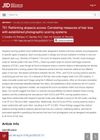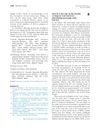 27 citations,
October 2020 in “Experimental Dermatology”
27 citations,
October 2020 in “Experimental Dermatology” Having a lot of gray hair and hair loss are linked to more severe COVID-19.

Current treatments for alopecia areata often fail to achieve and maintain significant hair regrowth.
 June 2005 in “British Journal of Dermatology”
June 2005 in “British Journal of Dermatology” Women find hair loss more distressing than men and often underestimate it, needing more public awareness and professional support.
August 2021 in “Journal of the American Academy of Dermatology” Oral baricitinib is effective and safe for treating alopecia areata.
 4 citations,
March 2021 in “Le infezioni in medicina”
4 citations,
March 2021 in “Le infezioni in medicina” Men with hair loss are more likely to experience moderate to severe COVID-19 symptoms.
 December 2023 in “European journal of dermatology/EJD. European journal of dermatology”
December 2023 in “European journal of dermatology/EJD. European journal of dermatology” More effective treatments are needed for severe alopecia areata.

Topical calcipotriol successfully treated hair loss in three patients with Alopecia Totalis.
 23 citations,
November 2018 in “Journal of the European Academy of Dermatology and Venereology”
23 citations,
November 2018 in “Journal of the European Academy of Dermatology and Venereology” The study concluded that severity of Frontal fibrosing alopecia is not linked to how long someone has it, can start before menopause, and eyebrow loss may be an early sign.
 February 2023 in “Global journal of health sciences and research”
February 2023 in “Global journal of health sciences and research” Zinc levels are not significantly linked to the presence or severity of alopecia areata.
 September 2022 in “Intisasi sains media”
September 2022 in “Intisasi sains media” A young child with complete hair loss improved significantly with a combination of hair growth treatments and laser therapy.
December 2021 in “Skin appendage disorders” A reliable severity score for female pattern hair loss was developed and validated.
4 citations,
December 2021 in “Journal of Cosmetic Dermatology” Severe hair loss is linked to worse COVID-19 outcomes, especially in younger men.
 4 citations,
February 2020 in “Dermatologic Therapy”
4 citations,
February 2020 in “Dermatologic Therapy” Poor sleep, meat-heavy diets, and junk food worsen hair loss, while sugary drinks may help.
September 2022 in “International Journal of Trichology” Trichoscopic measurements help determine the severity of female pattern hair loss.
 July 2022 in “Journal of Investigative Dermatology”
July 2022 in “Journal of Investigative Dermatology” The conclusion suggests that a new system for measuring hair loss could be created using automated analysis of photographs.
 2 citations,
May 2022 in “JAAD Case Reports”
2 citations,
May 2022 in “JAAD Case Reports” A woman lost all her hair after mild COVID-19, but it started to regrow after treatment with a specific medication.
Certain KIR genes in Indian SLE patients are linked to disease severity and could be biomarkers.
 66 citations,
June 2021 in “Journal of The American Academy of Dermatology”
66 citations,
June 2021 in “Journal of The American Academy of Dermatology” Baricitinib is effective and safe for treating severe alopecia areata.

research Skin
2 citations,
January 2011 in “Elsevier eBooks” Skin problems are common in Lupus patients and can indicate the disease's severity, requiring specific treatments and lifestyle changes.
 September 2023 in “IP Journal of Nutrition, Metabolism and Health Science/IP Journal of Nutrition Metabolism and Health Science”
September 2023 in “IP Journal of Nutrition, Metabolism and Health Science/IP Journal of Nutrition Metabolism and Health Science” Recognizing and managing hirsutism, alopecia, and acne is crucial for improving wellbeing in women with PCOS.
 January 1986 in “Journal of Steroid Biochemistry”
January 1986 in “Journal of Steroid Biochemistry” Women with severe acne, hirsutism, and androgenic alopecia often have higher levels of certain androgens, but the specific pattern can't be predicted just by looking at symptoms.
66 citations,
May 2011 in “Dermatologic therapy” Guidelines help design better trials to compare alopecia areata treatments.
 47 citations,
December 2019 in “Frontiers in immunology”
47 citations,
December 2019 in “Frontiers in immunology” A new mutation in the STING protein causes a range of symptoms and its severity may be affected by other genetic variations; treatment with a specific inhibitor showed improvement in one patient.
 4 citations,
January 2016 in “Annals of Dermatology”
4 citations,
January 2016 in “Annals of Dermatology” More severe hair loss links to thicker heart fat, suggesting possible heart disease risk.

Patients and doctors often agree on the severity of eyebrow and eyelash hair loss in severe alopecia areata.
 July 2023 in “International journal of trichology”
July 2023 in “International journal of trichology” The research found no clear link between the severity of male baldness and the scalp examination findings in Indonesian men.
 28 citations,
December 2017 in “Journal of Investigative Dermatology Symposium Proceedings”
28 citations,
December 2017 in “Journal of Investigative Dermatology Symposium Proceedings” Tofacitinib shows promise for treating severe hair loss in adults and teens, with many experiencing regrowth, but hair loss returns when treatment stops.
 44 citations,
November 2016 in “Journal of The American Academy of Dermatology”
44 citations,
November 2016 in “Journal of The American Academy of Dermatology” The updated SALT II tool offers a more precise way to measure scalp hair loss.
 8 citations,
May 2022 in “Journal of medicine and life”
8 citations,
May 2022 in “Journal of medicine and life” COVID-19 patients may experience hair loss, but it's not linked to their age or sex.
1 citations,
October 2007 in “International journal of radiation oncology, biology, physics” Gamma Knife radiosurgery is generally well tolerated with few major short-term side effects.























